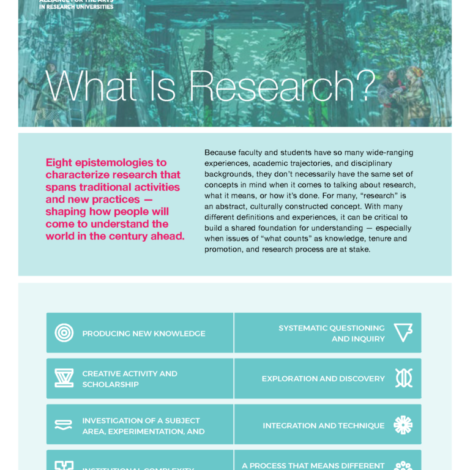What Is Research?

This research brief compiles a first survey of insights about questions of research, creative practice, knowledge production, and arts integration.
Because faculty and students have so many wide-ranging experiences, academic trajectories, and disciplinary backgrounds, they don’t necessarily have the same set of concepts in mind when it comes to talking about research, what it means, or how it’s done. For many, “research” is an abstract, culturally constructed concept. With many different definitions and experiences, it can be critical to build a shared foundation for understanding — especially when issues of “what counts” as knowledge, tenure and promotion, and research process are at stake.
With this landscape in mind, a2ru conducted interviews at over 38 universities with faculty, administrators, and students. These semi-structured interviews explored topics ranging from programs and curricula to leadership, collaboration, resources, incentives, tenure, and more.
Some of the key takeaways include:
- The definition of research means different things to different people. For some, definitions are pure, specific, and very distinct. For others, definitions are influenced by a mix of modes and types of research.
- Acknowledging and highlighting different types of research can be a valuable activity for building shared awareness and understanding among teams and departments.
- Even though people may be talking about the same approach and type of research, the language and framing of it may be different.
- Certain topics in definitions of research are correlated, and many people’s definitions are made up of multiple ideas about research.
- A useful approach may be to ask “when” different types of research happen in a collaboration or project.
- The main categories of research presented are likely to be stable, but their relative proportion and representation of different types among different groups may vary.
- People’s understanding of research includes the organizational structures and institutional complexity that make it possible.
- “Producing New Knowledge” is one of the most prevalent ways of understanding research, but it is not uniformly distributed across disciplinary clusters. The Fine Arts, Music, and Humanities disciplinary clusters referenced this topic less frequently than the Natural Science, Social Science, and Engineering clusters.
- The “Systematic Questioning and Inquiry,” “Exploration and Discovery,” and “Integration and Technique” topics show the least levels of difference between disciplinary clusters.
- Faculty with PhDs are more likely to refer to “Systematic Questioning and Inquiry” in their definitions of research.
Paper copies of What is Research? are available for purchase through Fulcrum
Download PDF (4 MB)